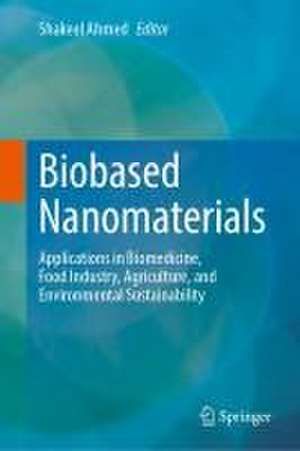Biobased Nanomaterials: Applications in Biomedicine, Food Industry, Agriculture, and Environmental Sustainability
Editat de Shakeel Ahmeden Limba Engleză Hardback – 14 mai 2024
Preț: 1561.82 lei
Preț vechi: 1904.66 lei
-18% Nou
Puncte Express: 2343
Preț estimativ în valută:
298.86€ • 312.67$ • 248.26£
298.86€ • 312.67$ • 248.26£
Carte tipărită la comandă
Livrare economică 03-17 aprilie
Preluare comenzi: 021 569.72.76
Specificații
ISBN-13: 9789819705412
ISBN-10: 981970541X
Ilustrații: XV, 535 p. 87 illus., 66 illus. in color.
Dimensiuni: 155 x 235 mm
Greutate: 0.94 kg
Ediția:2024
Editura: Springer Nature Singapore
Colecția Springer
Locul publicării:Singapore, Singapore
ISBN-10: 981970541X
Ilustrații: XV, 535 p. 87 illus., 66 illus. in color.
Dimensiuni: 155 x 235 mm
Greutate: 0.94 kg
Ediția:2024
Editura: Springer Nature Singapore
Colecția Springer
Locul publicării:Singapore, Singapore
Cuprins
Chapter 1_Introduction to Biobased nanomaterials.- Chapter 2_Types of biobased nanomaterials.- Chapter 3_Methods of fabrication of biobased nanomaterials.- Chapter 4_Characterization of biobased nanomaterials.- Chapter 5_Biobased nanomaterials in wound healing. - Chapter 6_Biobased nanomaterials in tissue engineering.- Chapter 7_Biobased nanomaterials in biomedical applications. - Chapter 8_Biobased nanomaterials in drug delivery. - Chapter 9_Biobased anomatnerials in biosensing.- Chapter 10_Biobased nanomaterials in regenerative medicine. - Chapter 11_Health and safety concern of biobased nanomaterials. - Chapter 12_Biobased nanomaterials in food industry.- Chapter 13_Biobased nanomaterials in food packaging.- Chapter 14_Biobased nanomaterials in food preservation.- Chapter 15_Biobased nanomaterials in increasing shelf life of food.- Chapter 16_Biobased nanomaterials in nutraceuticals.- Chapter 17_Biobased nanomaterials in environmental applications.- Chapter 18_Biobased nanomaterials in wastewater treatment.- Chapter 19_Environmental concern of biobased nanomaterials.- Chapter 20_Biobased nanomaterials in agriculture.- Chapter 21_Biobased nanomaterials in sensing technology.- Chapter 22_Biobased nanomaterials in energy storage devices.- Chapter 23_Advantage of biobased nanomaterials over traditional nanomaterials.- Chapter 24_Biodegradability and sustainability of biobased nanomaterials.- Chapter 25_Future prospects of biobased nanomaterials.
Notă biografică
Dr. Shakeel Ahmed PhD is working as an assistant professor of chemistry at higher education department, Government of Jammu and Kashmir and assistant professor at postgraduate department of chemistry, Government Postgraduate College Rajouri, Jammu and Kashmir, India. He obtained a first degree in general science from Government Postgraduate College Rajouri (University of Jammu) followed by master’s degree and doctoral degree in chemistry from Jamia Millia Islamia, a central university, New Delhi. He gained post-doctoral experience in bio composite materials at Indian Institute of Technology, Delhi. He has published several research publications in area of green nanomaterials and biopolymers for various applications including biomedical, packaging, and water treatment. He is regular member of American Chemical Society (ACS), USA, member of Royal Society of Chemistry (MRSC), UK, member of International Association of Advanced Materials (IAAM), Sweden and life member of Asian Polymer Association and Society of Materials Chemistry (India). He is the active reviewer and member of editorial board of many reputed journals. He has published more than 25 books in nanomaterials and green materials with publishers of international repute. His named has been listed among the top 2% scientists of the world published by Stanford University consequently since last three years. He is the fellow of The Linnean Society of London and International Society for Development and Sustainability (ISDS), Japan. He is the recipient of Best Professor of The Year Award 2020, Young Scientist Award, and Vivekananda Prize 2022.
Textul de pe ultima copertă
This book comprehensively covers various aspects of biobased nanomaterials, including their types, fabrication methods, characterization techniques, and applications in different fields. The book starts with an introduction to biobased nanomaterials, highlighting their significance in various fields due to their unique properties. The first few chapters cover the different types of biobased nanomaterials, their properties, and how they are extracted from various natural sources. The methods of fabrication of biobased nanomaterials are discussed in detail, including the techniques for controlling their size, shape, and composition. It then delves into the characterization of biobased nanomaterials, discussing the different techniques used to determine their properties, including their morphology, size, structure, and composition. The subsequent chapters explore the various applications of biobased nanomaterials in different fields such as environmental applications, wound healing, tissue engineering, food industry, agriculture, sensing technology, biomedical applications, and energy storage devices. The advantages of biobased nanomaterials over traditional nanomaterials are highlighted, including their biodegradability and sustainability. The environmental concerns associated with biobased nanomaterials, as well as the health and safety concerns, are also discussed. The book concludes by looking at the prospects of biobased nanomaterials and how they can contribute to sustainable development. Overall, the book is an informative and comprehensive book that provides a thorough understanding of biobased nanomaterials and their various applications. It is a valuable resource for researchers, students, and professionals in various fields such as materials science, chemistry, biology, and environmental science. alike.
Caracteristici
Discusses fabrication, characterization, and advantages of biobased nanomaterials over traditional nanomaterials Emphasizes on biodegradability, sustainability, and potential for sustainable development Provides comprehensive coverage of biobased nanomaterials from types to applications
